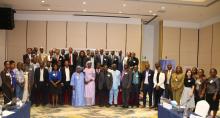WHO Ethiopia hosts a high-level summit on appropriate use of antimicrobials in Africa
Representatives from 12 countries in Africa are convened in Addis Ababa, Ethiopia, for a two-day regional summit on responsible and appropriate use of antimicrobials.
AMR (Anti-Microbial Resistance) occurs when bacteria, viruses, fungi, and parasites no longer respond to antimicrobial agents. As a result of drug resistance, antibiotics and other antimicrobial agents become ineffective, and infections become difficult or impossible to treat, increasing the risk of disease spread, severe illness, and death. The World Health Organization (WHO) organized the summit in the context of the recent African Union Summit, which encouraged greater cooperation and resource mobilization for health system strengthening and pandemic preparedness on the continent.
In her welcoming speech, Acting Representative of WHO-Ethiopia Country Office Dr. Nonhlanhla Dlamini said: Antimicrobial Resistance (AMR) is a significant threat to global public health. The global and regional burden is alarming. Sub-Saharan African countries bear the heaviest burden of resistant bacterial infections, with the highest AMR-associated death rates, at 99 deaths per 100,000 population.”
According to Dr. Dlamini, “AMR puts at risk decades of advances to control infectious diseases such as malaria, HIV/AIDS, tuberculosis, and sexually transmitted infections. The consequences of AMR during surgery, cancer, and the management of immune-suppressed patients are frightful.
“The COVID-19 pandemic has further fueled the threat of AMR due to extensive misuse and overuse of antimicrobials. We need to control the use of antimicrobials more than ever through a stronger regulatory system and antimicrobial stewardship”, the Acting Representative emphasized.
Misuse and overuse of antimicrobials are the main drivers in the development of drug-resistant pathogens. The cost of AMR to the economy is high, with the highest impact on Low and Middle-Income Countries.
“AMR causes more deaths than HIV/AIDS, tuberculosis, or malaria. In addition to death and disability, prolonged illness results in longer hospital stays, the need for more expensive medicines, and financial hardship for those impacted. In 2019 alone, 4.95 million deaths were associated with AMR, and 1.27 million deaths were directly attributable to it.” Dr. Walter Fuller from the WHO African Region said.
“Countries in the African region must act now to make informed and country-specific policy decisions. They should also have good coordination, integrate interventions where necessary by leveraging on those already existing, use evidence-based guidelines to guide prescribing, access to good quality and affordable antimicrobials”, Dr. Walter added.
On his part, Mr. Thomas Joseph from WHO Headquarters underlined the need for “all countries to develop a coherent set of actions to promote responsible and appropriate use of antimicrobials to reduce the burden of drug-resistant infections.”
Opening the summit, Ethiopian State Minister of Health Dr. Dereje Duguma said, “Ethiopia’s government is fully committed to preventing AMR. Through its National Action Plan on the Prevention and Control of AMR, the government of Ethiopia is executing coordinated activities at all levels, and the Ethiopian Ministries of Health, Agriculture, and Environment are working in close collaboration with WHO and other partners to ensure responsible and appropriate use of antimicrobials.”
“The government of Ethiopia is also committed to work in close collaboration with all African countries in fighting the challenges of AMR,” the State Minister said and called upon all partners to quickly act on reversing the impact of AMR.
Ethiopia conducted the first AMR baseline survey in 2009 and launched the first National Strategic Framework for the prevention and containment of AMR in 2011. Ethiopia is also among the first countries to have a national strategic document on AMR and the implementation of Antimicrobial Stewardship (AMS).
“More investments and active collaboration among different pillars of health systems are essential to combat AMR,” Dr. Nonhlanhla said and reiterated WHO’s commitment to supporting the endeavor of the Ethiopian government in strengthening AMR response.
WHO believes effective implementation of Antimicrobial Stewardship is one of the critical, sustainable, and cost-effective strategies to control AMR. AMR-Multi-partner trust fund has catalyzed the collaboration and coordination between WHO and other development partners for AMS strengthening.
Financial support from the Kingdom of Saudi Arabia has helped scale up the implementation of antimicrobial stewardship from a few health facilities to around 100 across Ethiopia.
The healthcare leaders and AMR focal points from Burkina Faso, the Democratic Republic of Congo, Ethiopia, Ghana, Kenya, Liberia, Nigeria, Senegal, Sierra Leone, Tanzania, Zambia, and Zimbabwe are actively participating in the summit, which is expected to share challenges and come up with country-specific strategies that can help in improving governance, coordination, and management of antimicrobial stewardship at the national level.
